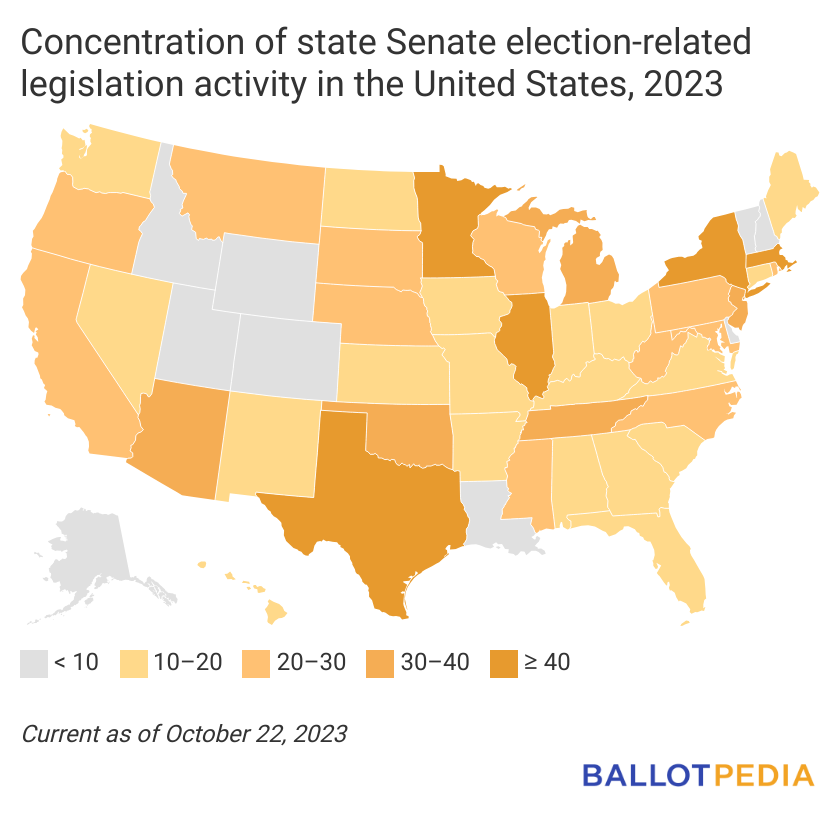As of Oct. 22, Ballotpedia has tracked 20 election-related bills in the Wisconsin State Senate since the beginning of the year. Of the 20, Ballotpedia tracked two from Oct. 16-22. Republicans sponsored one, while a bipartisan group of legislators sponsored the other. The two bills are below:
- WI SB528: Top-five primaries and instant runoff voting for the offices of U.S. senator and U.S. representative in Congress (FE), Reps. Jimmy Anderson (D), Deb Andraca (D), Steve Doyle (D), Dora Drake (D), Alex Joers (D), Daniel Riemer (D), Katrina Shankland (D), Lisa Subeck (D), Robert Donovan (R), Scott Johnson (R), Joel Kitchens (R), Tony Kurtz (R), Jeffrey Mursau (R), Todd Novak (R), David Steffen (R), Ron Tusler (R), and Shannon Zimmerman (R), and Sens. Jeffrey Smith (D), Mark Spreitzer (D), Robert Cowles (R), and Jesse James (R).
- “As introduced, this bill:
- Establishes that U.S. Senate and House members will be elected via ranked-choice-voting where a voter may indicate a preference for up to five candidates.
- Specifies ballot design requirements, including ranked-choice-voting instructions, and that candidate order will be chosen by lot.
- Direct county clerks to prepare a special ballot for U.S. congressional races.
- Requires the board of canvassers to provide the number of votes cast per candidate round by round with other election results.
- Requires the board of canvassers to explain each rejected vote.”
- Click the hyperlinked bill above to learn more.
- “As introduced, this bill:
- WI SJR78: Prohibiting state and local governments from using privately sourced moneys or equipment in connection with the conduct of elections and specifying who may perform tasks related to the conduct of an election (second consideration), Reps. Scott Allen (R), David Armstrong (R), Tyler August (R), Elijah Behnke (R), Amy Binsfeld (R), Ty Bodden (R), Mark Born (R), Janel Brandtjen (R), Robert Brooks (R), Calvin Callahan (R), Alex Dallman (R), Barbara Dittrich (R), Robert Donovan (R), Cindi Duchow (R), James Edming (R), Joy Goeben (R), Chanz Green (R), Rick Gundrum (R), Nate Gustafson (R), Karen Hurd (R), Scott Johnson (R), Gae Magnafici (R), Dave Maxey (R), Paul Melotik (R), Clint Moses (R), David Murphy (R), Jeffrey Mursau (R), Amanda Nedweski (R), Jerry O’Connor (R), William Penterman (R), Kevin Petersen (R), Jon Plumer (R), Nik Rettinger (R), Donna Rozar (R), Peter Schmidt (R), Ellen Schutt (R), Patrick Snyder (R), Shae Sortwell (R), David Steffen (R), Robert Summerfield (R), Robert Swearingen (R), and Robert Wittke (R), and Sens. Joan Ballweg (R), Rachael Cabral-Guevara (R), Robert Cowles (R), Mary Felzkowski (R), Daniel Feyen (R), Howard Marklein (R), Stephen Nass (R), Rob Stafsholt (R), Duey Stroebel (R), Patrick Testin (R), Cory Tomczyk (R), Van Wanggaard (R), and Eric Wimberger (R).
- “As introduced, this bill proposes a constitutional amendment in the form of two questions, to be voted upon by voters in April 2023, prohibiting the use of private funds in conducting elections and requiring election related tasks to be performed by only election officials.”
During the week of Oct. 16-22, Ballotpedia tracked six Senate election-related bills nationally. As of Oct. 22, Ballotpedia has tracked 1,197 Senate bills nationally. Ballotpedia tracked the most Senate bills this year in the New York State Senate with 166, while Ballotpedia tracked the fewest Senate bills in the Vermont State Senate with two.

As of Oct. 22, Ballotpedia has tracked 546 Senate bills in Democratic trifectas and 475 Senate bills in Republican trifectas. A trifecta is when one political party holds the governorship and majorities in both chambers of the state legislature. Ballotpedia has tracked 176 Senate bills in states where neither party holds trifecta control.
The Wisconsin Senate is scheduled to be in session from Jan. 3 to Dec. 31 this year. In 2022, Ballotpedia tracked 36 Senate bills related to election administration. One of these bills passed both chambers and was enacted into law. Wisconsin is a divided government, meaning neither party holds trifecta control.
Additional reading:


